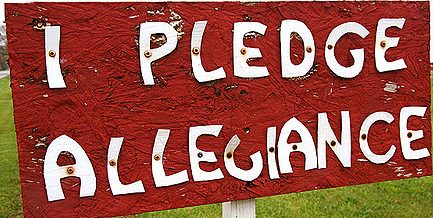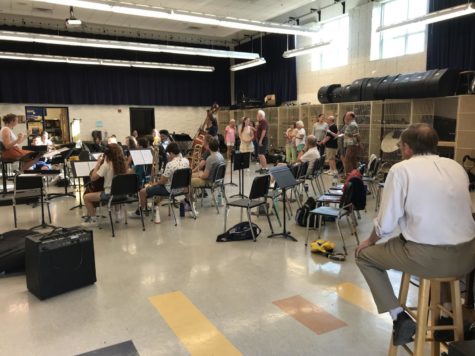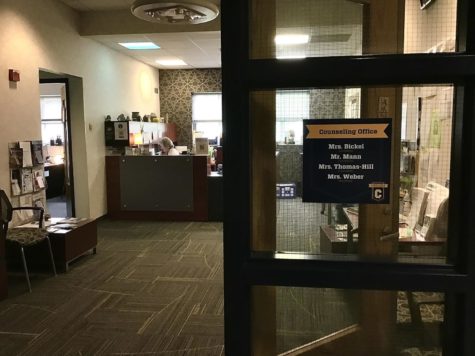I Pledge Allegiance . . . Or Do I?

Last year, my mom came home from work fuming. She works in the office at the elementary school, North Creek, and a parent had come in and was talking on the phone. The principal came over on the announcements and my mom asked the parent to refrain from talking during the pledge of allegiance. The parent ignored my mom and continued speaking loudly in the office during the pledge, angering my mother. She came home from work and was so mad, and I could understand why: I’d be mad too if someone had ignored me when I politely asked them to stop, but this wasn’t the source of her anger. Her anger was rooted in the fact that someone had been rude enough to talk during the pledge. I agreed with her, I mean, I think it’s disrespectful to our country to speak when we’re supposed to be pledging allegiance to it, but my mom had a whole extra level of anger. Her fury made me stop and think about the pledge that we say everyday. I had never really given much thought to saying the pledge before that; it was just something that we did all the time, it was the norm. Like most of you probably think too, the pledge to me had always been a fundamental constant of school, like memorizing a locker com, going to the next class when the bell rang, raising your hand before speaking, or getting smiley fries on Wednesdays, but it wasn’t until this conversation with my mom that I really considered why we say the pledge. I mean, I know why everyone says we say it: to show our patriotism. That’s not why I say it. I say it because it’s just what we do at school. It wasn’t even until this experience that I realized we really shouldn’t be saying the pledge of allegiance in school at all.
The main reason the pledge is so heavily protested in America today is because of the words “under God” at the end. “Under God” alienates those who are not Christian or don’t believe in God. Since about 25% of our population is atheist, one fourth of our people are being misrepresented by this phrase in a pledge that’s supposed to unify the country. Also, law forbids that these words even exist in our pledge. Our country has the separation of the church and state, meaning that in public school, we shouldn’t be making explicit references to God or his love for our country–it goes against this seperation of government and religion. Because we have these laws put into place, and the first amendment gives us freedom of religion, many citizens see this reference to God as impeding on such freedom, as they’re being told to say things about God that they do not believe in. The reason that legislation allowed “under God” to be said is because “it is tradition,” but in actuality, the pledge was first created and used in public schools in the 1890s–the words “under God” were not even included until the 1950s, and thus the whole argument that it is a tradition in our country goes out the window. The pledge did not intend to use the words “under God,” so why should they be included?
Even though this is an important aspect of the negatives of the pledge, there is a much bigger reason as to why schools should not enforce the pledge. I understand that most believe when we say the pledge, we are honoring our flag and those who have served our country–but I don’t believe that saying the pledge actually does this for us.
Students do not really have a choice in whether or not we’re allowed to say the pledge. Every student has the option to not say the pledge (according to a court case in the 50s), and at CHS, we have a choice as to whether or not we say the pledge. However, it doesn’t always feel that way. In my fourth hour when we say the pledge, everyone stands and every student says the pledge, so I’d feel awkward if I didn’t say it. There is often a social stigma if you don’t say the pledge: it’s the pressure to conform. Everyone else does it, and you’ve been doing it since you were five, and, a lot of times, not standing or saying the pledge is seen to some people as “hating America.” In reality, this especially is not the case. I dislike saying the pledge not because I refuse to support my country, but because I refuse to say things I don’t truly believe.
I think that if we honestly had the choice to say the pledge or not–if nobody came over the announcements and asked that we stand–most people wouldn’t do it. None of us think about what we are doing when we do it. It’s an automatic response to hearing “please rise,” and if those words were never said, we wouldn’t think twice about not doing it.
We as students get roped into saying something we don’t think about, marking just another reason as to why we should not have to say the pledge. Students who say the pledge often aren’t conscience of the words they are saying. Sometimes I feel as though I’m disrespecting the flag when I say the pledge because honestly, I’m not thinking about what I’m saying. How am I honoring my country by saying words I don’t care about? How am I showing my pride in America by muttering with my hand over my heart? How am I being a dutiful citizen by staring at a flag for thirty seconds every day? There are much better ways to show our pride in America than by mindlessly reciting a pledge we don’t care about. I read a story about a parent who heard that their six year old had started saying the pledge. When she asked her child about it, who called it the “American prayer,” she quickly realized that the child didn’t even understand the words they were saying. In fact, the child didn’t even know what “allegiance” meant. So yes, I’m all for patriotism and supporting our troops, but to me, it seems like making children recite something they cannot comprehend is not the way to do it.
Listen to the way your class says the pledge tomorrow. It sounds like mindless drones spitting out words that aren’t even correlated. Even better, listen to the way you say the pledge, because I guarantee what you’re saying doesn’t match the way you’re saying it. Hopefully you’ll think about what you’re saying, and just as importantly–you’ll think about why you’re saying it.
So, while the parent who ignored my mom was being rude and disrespectful when she talked on the phone instead of stopping for the pledge, how much worse was she than those who mindlessly recite the pledge without even considering what they pledge allegiance to?

Madilynn is a current senior at Chelsea High School. She's involved in theatre guild, tennis, Student Council, and Yearbook Club. In her free time she...





Anonymous • Dec 18, 2017 at 2:08 pm
I just want to say that if you want to sound more professional/like you know what you’re talking about, you shouldn’t say “‘Under God’ alienates those who are not Christian”. There are other religions that believe in God. Christian just means that they believe in Jesus Christ as the son of God as well. Just thought you might want to have all your facts right. Also, I’d like to say that I do agree, most people just say the pledge without thinking, and they don’t even know what half of it means. But I also think it’s important that there is some way for kids to show their patriotism in school. I don’t think we should just completely shut it down. I know there are a lot of people who think America is the worst, but they haven’t lived everywhere else. We could be a lot worse off. Although it’s far from perfect, there are many rights and freedoms people take for granted because they’ve always had them. For example, freedom of speech. A lot of countries don’t have the same level we do. So yes saying the Pledge of Allegiance can be monotonous, but kids should still show some level of patriotism at school if not that.
Anonymous • Dec 19, 2017 at 2:25 pm
Very well said my friend
Charles Korner • Dec 26, 2017 at 8:00 pm
The problem is that “Under God” clearly does refer to Christianity because of the historical context that surrounds the usage in the pledge. The words “Under God” were added in 1954. The pretext was that they were honoring Lincoln’s Gettysburg Address. Personally I don’t buy that considering not all transcripts of the Gettysburg Address even have the phrase Under God and two words seem like a pretty obscure tribute to a speech. I’m reasonably sure no one hears the pledge of allegiance in the morning and immediately connects it to the Gettysburg Address. Regardless the advocates of the wording change reveal the true nature. The wording change was adopted and pushed by the Knights of Columbus, a Catholic Christian organization. The strongest advocate was a Presbyterian Christian minister, George MacPherson Docherty, and he himself stated what the change in wording was all about. “There was something missing in the pledge, and that which was missing was the characteristic and definitive factor in the American way of life.” The change affirmed the religious aspect of American culture. What was this religious aspect in 1954? It was considered distinctly and exclusively Christian. The argument that “Under God” is inclusive of other Abrahamic religions, (I assume you mean Abrahamic considering it would be more of a stretch to imply this honors religions with completely different conceptions of a deity/deities), is based on a fundamental misconstruing of the culture in which the change was made. To a Nationalist Presbyterian in 1954, Under God clearly applied to Christianity. What’s more, the whole argument in favor of the phrase falls apart if we accept what you have stated. If Under God applies also to Islam and Judaism then where is the primary argument for it, that it honors our heritage as Americans? If you do not consider it to be honoring the exclusive cultural prominence of Christianity, then why should Abrahamic Religions be honored but not other beliefs like Atheism or Deism. In fact, considering Thomas Jefferson was a Deist, and seems rather important to our “American heritage” then why does the Pledge not read “One nation, under God, but not actually because God does not interfere on earth and therefore we have to take responsibility for our own actions, he certainly doesn’t play favorites among nations, indivisible in liberty…”? In fact while we’re on the topic of Jefferson he was violently opposed to religious influence in government and all forms of clericalism so this seems like quite a violations of our American heritage actually. The point I’m trying to make here is, we can play semantics all day about whether Under God technically excludes Judaism and Islam or not but at the end of the day the historical context makes it obvious that it refers to Christianity, or if it doesn’t, it’ even more ridiculous. And regardless of whether it includes two more religions or not it still excludes the 20% or more of the population without a religious tradition. So I’m reasonably sure the author of the article is aware of the existence of Islam and Judaism, it doesn’t alter the point. Eisenhower stated exactly why the words were added “From this day forward, the millions of our school children will daily proclaim in every city and town, every village and rural school house, the dedication of our nation and our people to the Almighty…. In this way we are reaffirming the transcendence of religious faith in America’s heritage and future; in this way we shall constantly strengthen those spiritual weapons which forever will be our country’s most powerful resource, in peace or in war.“ Glorification of a single god, a single faith, and a single America.
In terms of the second part of your comment, there is no limit on the ability of kids to show their patriotism at school. They have countless ways to do so, in particular how the rest of us express our opinions, through talking. The pledge of allegiance isn’t an option to be inclusive to patriotic kids, it’s a grand statement by the American government that the next generation will always serve America’s interests. No one ever told me I didn’t have to say the pledge. At some point I just stopped saying it. No one told me I didn’t have to stand. Eventually I made the decision to stop standing. Thanks to the challenges brought by Jehovah’a Witnesses in the 20s and 30s, I can’t be forced to. But that doesn’t change the fact that there is overwhelming pressure, by peers, teachers, and just habit to just stand up and recite your daily prayer without understanding a word that passes out your mouth. And you’re correct. I despise the American government but contrary to popular belief it isn’t because I don’t know about the oppressive regimes outside our beloved borders. It’s because I know who put them in power. The Taliban took power in 1996. Today it is one of the greatest examples propagated by patriots of the enemies kept at bay by America. The mujahideen groups that seized power in 1996 had already been funded since the late 70s by the CIA, who, with support from President Ronald Reagan had funneled supplies and weapons through Pakistan to the Taliban precursors for years in hopes of breaking Soviet power in Afghanistan. Augusto Pinochet, seized power in a military coup orchestrated by the CIA in Chile. President 1974 to 1990. Responsible for the murder of a two least 3,000 dissidents and civil torture of around 29,000. Muhammad Suharto, seized power in a US orchestrated military coup in Indonesia. Acting President 1967 to 1998. Responsible for the mass slaughter of between 500,000 and 1 million ethnic Chinese and communist dissidents. These are just a few examples. To be honest, I think I’d have far more hatred for American if I lived outside our protected bubble. You end your comment by stating not only that children should have the option to express patriotism, but that they ought to show patriotism period. In light of what I’ve just mentioned, I must ask. Why? And in terms of our so called freedoms, a government cannot bestow freedom unless it has already declared itself owner of said freedom. If it it has declared ownership of our freedom before, it can do it again anytime it wishes. Which makes our freedoms rather trivial. Bread and circuses.
No hard feelings though. 🙂